|
|
|
Sort Order |
|
|
|
Items / Page
|
|
|
|
|
|
|
| Srl | Item |
| 1 |
ID:
145957
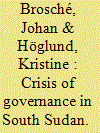

|
|
|
|
|
| Summary/Abstract |
Since mid-December 2013, thousands of people have been killed in armed conflict in South Sudan. The fighting is entrenched in a power struggle between the main political contenders ahead of elections which were scheduled for 2015. This article examines the violence in South Sudan since the North–South war ended with a focus on the consequences of the introduction of electoral politics. Our research contributes to the literature on state-building and peace-building in war-torn societies, by exploring how the extreme levels of violence are linked to three groups of factors. First, the stakes involved in being part of the government are extremely high, since it is the only way to secure political and economic influence. Second, the actors involved in political life are dominated by individuals who held positions within the rebel groups, which increases the risk of political differences turning violent. Third, the institutions important for a legitimate electoral process, and which work to prevent violence, are weak or non-existent.
|
|
|
|
|
|
|
|
|
|
|
|
|
|
|
|
| 2 |
ID:
084349
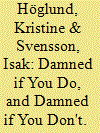

|
|
|
|
|
| Publication |
2008.
|
| Summary/Abstract |
Third-party actors who mediate or monitor peace often strive to uphold an image of neutrality. Yet, they commonly face accusations of partiality. The Nordic engagement in the Sri Lankan peace process is an illustration of this puzzle: despite the efforts to uphold an image of being neutral mediators and monitors, they have been seen as favoring one side or the other. This article suggests that part of the explanation for their failure to be seen as neutral lies in the fact that armed conflicts are characterized by certain asymmetries between the main antagonists - in capabilities, status and behavior. These imbalances pose particular challenges to the third party aspiring to act in a neutral manner. We suggest that third parties have two strategies available to deal with imbalances in the relationship between the contenders: 1) they can choose to disregard the asymmetrical relationship and act in an even-handed manner or 2) they can seek to counterbalance the lopsidedness. This article explores the dynamics of these strategies by analyzing the Nordic involvement in Sri Lanka's peace process that began in 2002.
|
|
|
|
|
|
|
|
|
|
|
|
|
|
|
|
| 3 |
ID:
084485
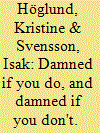

|
|
|
|
|
| Publication |
2008.
|
| Summary/Abstract |
Third-party actors who mediate or monitor peace often strive to uphold an image of neutrality. Yet, they commonly face accusations of partiality. The Nordic engagement in the Sri Lankan peace process is an illustration of this puzzle: despite the efforts to uphold an image of being neutral mediators and monitors, they have been seen as favoring one side or the other. This article suggests that part of the explanation for their failure to be seen as neutral lies in the fact that armed conflicts are characterized by certain asymmetries between the main antagonists - in capabilities, status and behavior. These imbalances pose particular challenges to the third party aspiring to act in a neutral manner. We suggest that third parties have two strategies available to deal with imbalances in the relationship between the contenders: 1) they can choose to disregard the asymmetrical relationship and act in an even-handed manner or 2) they can seek to counterbalance the lopsidedness. This article explores the dynamics of these strategies by analyzing the Nordic involvement in Sri Lanka's peace process that began in 2002.
|
|
|
|
|
|
|
|
|
|
|
|
|
|
|
|
| 4 |
ID:
170801


|
|
|
|
|
| Summary/Abstract |
Elections are held in nearly all countries in the contemporary world. Yet despite their aim of allowing for peaceful transfers of power, elections held outside of consolidated democracies are often accompanied by substantial violence. This special issue introduction article establishes electoral violence as a subtype of political violence with distinct analytical and empirical dynamics. We highlight how electoral violence is distinct from other types of organized violence, but also how it is qualitatively different from nonviolent electoral manipulation. The article then surveys what we have learned about the causes and consequences of electoral violence, identifies important research gaps in the literature, and proceeds to discuss the articles included in the special issue. The contributions advance research in four domains: the micro-level targeting and consequences of electoral violence, the institutional foundations of electoral violence, the conditions leading to high-stakes elections, and electoral violence in the context of other forms of organized violence. The individual articles are methodologically and geographically diverse, encompassing ethnography, survey vignette and list experiments and survey data, quantitative analyses of subnational and crossnational event data, and spanning Africa, Latin America, and Asia.
|
|
|
|
|
|
|
|
|
|
|
|
|
|
|
|
| 5 |
ID:
170808
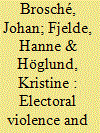

|
|
|
|
|
| Summary/Abstract |
Why do the first multiparty elections after authoritarian rule turn violent in some countries but not in others? This article places legacies from the authoritarian past at the core of an explanation of when democratic openings become associated with electoral violence in multi-ethnic states, and complement existing research focused on the immediate conditions surrounding the elections. We argue that authoritarian rule characterized by more exclusionary multi-ethnic coalitions creates legacies that amplify the risk of violent elections during the shift to multiparty politics. Through competitive and fragmented interethnic relations, exclusionary systems foreclose the forging of cross-ethnic elite coalitions and make hostile narratives a powerful tool for political mobilization. By contrast, regimes with a broad-based ethnic support base cultivate inclusive inter-elite bargaining, enable cross-ethnic coalitions, and reduce incentives for hostile ethnic mobilization, which lower the risk of violent elections. We explore this argument by comparing founding elections in Zambia (1991), which were largely peaceful, and Kenya (1992), with large-scale state-instigated electoral violence along ethnic lines. The analysis suggests that the type of authoritarian rule created political legacies that underpinned political competition and mobilization during the first multiparty elections, and made violence a more viable electoral strategy in Kenya than in Zambia.
|
|
|
|
|
|
|
|
|
|
|
|
|
|
|
|
| 6 |
ID:
089987


|
|
|
|
|
| Publication |
2009.
|
| Summary/Abstract |
What are the causes of electoral violence? And how does electoral violence influence conflict resolution and democracy? This article argues for a conceptualization of electoral violence as a specific sub-category of political violence, determined mainly by its timing and target. The enabling conditions and triggering factors can be identified in three main areas: 1) the nature of politics in conflict societies, 2) the nature of competitive elections, and 3) the incentives created by the electoral institutions. These clusters of factors are important for understanding electoral violence both between different societies and across elections in a specific country.
|
|
|
|
|
|
|
|
|
|
|
|
|
|
|
|
| 7 |
ID:
183151
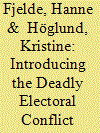

|
|
|
|
|
| Summary/Abstract |
This article introduces the Deadly Electoral Conflict dataset (DECO): a global, georeferenced event dataset on electoral violence with lethal outcomes from 1989 to 2017. DECO allows for empirical evaluation of theories relating to the timing, location, and dynamics of deadly electoral violence. By clearly distinguishing electoral violence from related (and sometimes concurrent) instances of organized violence, DECO is particularly suitable for investigating how election-related violence is connected to other forms of violent political contention. In the article, we present the theoretical and methodological underpinnings of the data collection and discuss empirical patterns that emerge in DECO. We also demonstrate one potential use of DECO by examining the association between United Nations peacekeeping forces and the prevalence of deadly electoral violence in conflict-affected countries.
|
|
|
|
|
|
|
|
|
|
|
|
|
|
|
|
| 8 |
ID:
079781


|
|
|
|
|
|
|
|